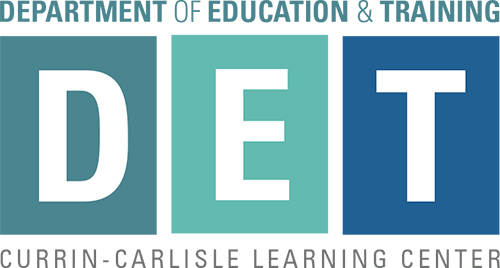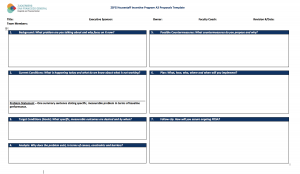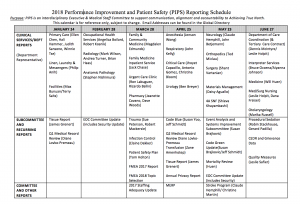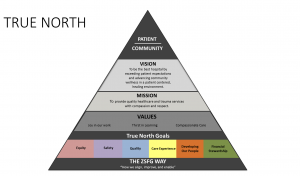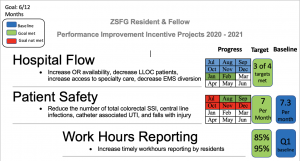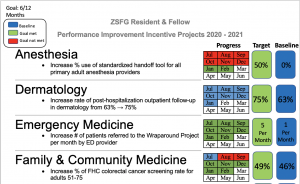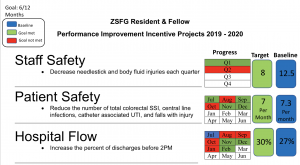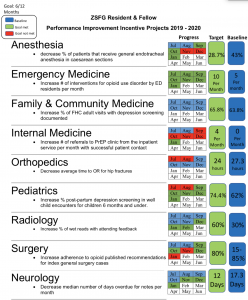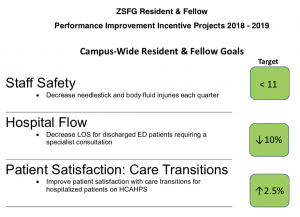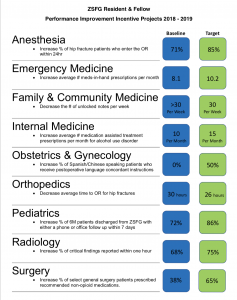ZSFG Resident and Fellow Performance Improvement Incentive Program
Program Overview
ZSFG, UCSF and SFDPH collaboratively support the Resident and Fellow Performance Improvement Incentive Program. This program is separate but aligned with the UCSF Medical Center Incentive Program.
The primary goals of the program are to teach the improvement process and engage residents and fellows in quality improvement projects that are aligned with the True North goals for the ZSFG hospital and campus.
If the project targets are met, residents and fellows who spend at least 88 days at ZSFG will receive financial incentives (up to $1,200). In addition to participating in the hospital-wide initiatives, each resident and fellowship program is encouraged to submit a program-specific goal.
The deadline for department proposals is April 30, 2021.
Please contact or send questions to:
Dr. Esther Chen, GMEC chair
Dr. William Huen, Associate Chief Medical Officer
Antonio Hernandez, Program Specialist
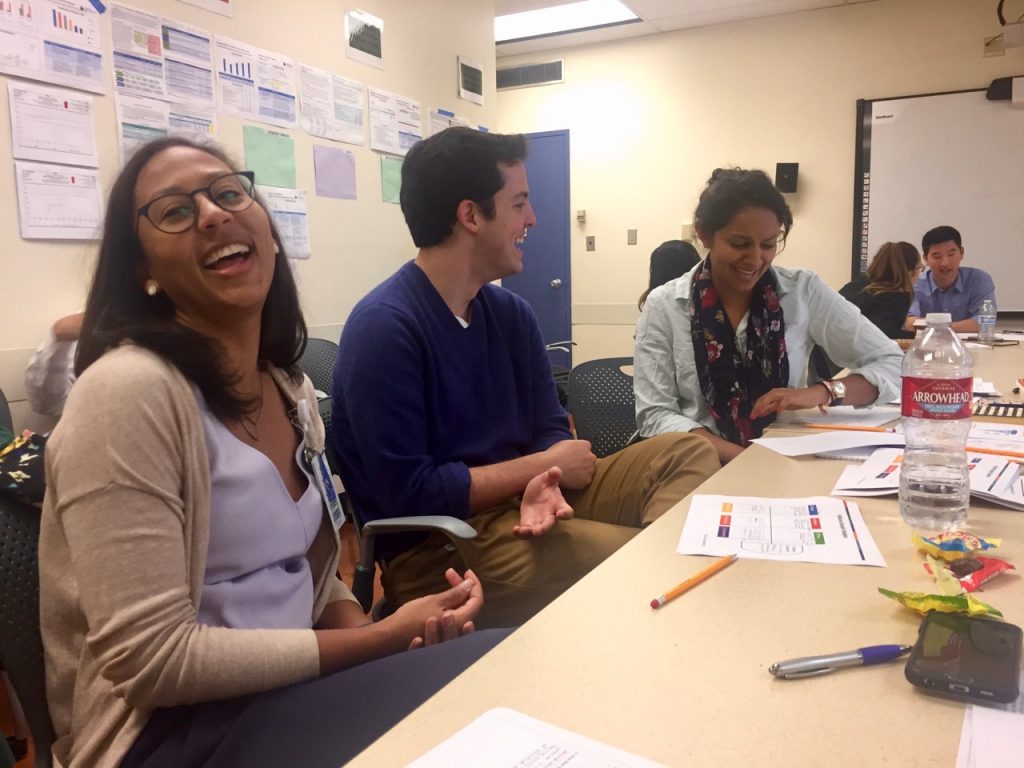
Department-Specific Proposal Requirements
1. Identify resident or fellow champion(s) who will take the lead for your departmental project
o Present project updates at the quarterly GMEC meeting
o Submit monthly project metrics to the GMEC chair
o Complete and submit a mid-year status report
o Participate in one QI or coaching session prior to project implementation
o Complete final poster and showcase poster presentation at the annual ZSFG Medical Staff Dinner and UCSF GME Celebration
o Champions will receive a separate stipend for completing all the requirements above
2. Identify QI faculty leader and Performance Improvement Patient Safety Committee (PIPS) faculty representative to approve and sponsor your project and incorporate your progress into the departmental PIPS report
3. Complete project proposal using the ZSFG Housestaff Incentive A3 Template and review for approval by 1) your faculty sponsor, 2) PIPS representative, 3) interdisciplinary member of the stakeholder team.
4. Submit proposal for Committee review and approval, responding and revising based on feedback.
5. All eligible ACGME and non-ACGME residents and fellows will participate in the 3 hospital-wide initiatives. Residents and Fellows have the option of designing and implementing an additional department-specific initiative so that there are four incentive opportunities. Metrics for each project must be met for at least 6 months within an academic year to receive the financial incentive. Residents and fellows who have at least three months per year at ZSFG will receive up to $400 for each achieved metric, limited to a total of $1200 for three metrics.
Application Criteria
An interdisciplinary committee will review and approve proposals based on the following criteria:
• ALIGNMENT - Project goals should align with departmental or organizational targets or goals, with approval by the departmental PIPS representative. Initiatives targeting or assessing impact on EQUITY or KNOWN OR POTENTIAL DISPARITIES will be prioritized.
• ENGAGEMENT - Proposals should clearly describe engagement of trainees, faculty and interdisciplinary team members in the design, implementation or communication of the project.
• IMPACT - Proposals will be evaluated based on potential impact on the problem. This will be based on a demonstrated understanding of the problem in current state and analysis, evaluation of proposed countermeasures, and clearly defined metrics that can be collected, tracked and reported at least monthly. (i.e. Please avoid dependence on new EPIC customization or reporting)
Application Tools and Resources
2020-21 Housestaff Incentive Program Updates
We have identified three ZSFG-Wide Goals for 2020-21:
1. Ensuring Hospital Flow (OR availability, lower level of care, specialty care access, EMS diversion)
2. Improving Patient Safety by Reducing Adverse Events
3. Improving Work Hours Reporting
2019-20 Housestaff Incentive Program Updates
We have identified three ZSFG-Wide Goals for 2019-20:
1. Reducing Needlestick Injuries/Exposures for Trainees
2. Improving Patient Safety by Reducing Adverse Events
3. Improving Patient Flow as Measured by Discharge by 2 pm
2018-19 Housestaff Incentive Program Updates
We have identified three ZSFG-Wide Goals for 2018-19:
1. Reducing Needlestick Injuries/Exposures for Trainees
2. Improving Patient Satisfaction with Care Transitions (HCAHPS)
3. Improving Length of Stay for Emergency Room Patients Requiring Consultation
2017-18 Housestaff Incentive Program Updates
We identified three ZSFG-Wide Goals for 2017-18:
1. Reducing Needlestick Injuries/Exposures for Trainees
- TARGET MET: Reduced needlesticks to below target in 2 of 4 quarters
2. Improving Patient Satisfaction with Provider Communication (HCAHPS)
- TARGET MET: Improved above goal in 2 of 4 quarters, and year to date.
3. Improving Length of Stay for Emergency Room Patients Requiring Consultation
- TARGET MET: Six departments successfully lowered by 10% in 2 of 3 quarters
Four Departments proposed Department-Specific Goals for trainees in 2017-18:
1. Family & Community Medicine: Improving Colorectal Cancer Screening
- TARGET MET (PARTIAL): Improved to 68.1%
2. Internal Medicine: Opioid Safety
- TARGET MET: Improved co-prescription of naloxone from 9.5% to 69%
3. Pediatrics: STD Screening
- TARGET MET: Improved chlamydia screening from 34% to 61.5%
4. Obstetrics & Gynecology
- TARGET MET: Improved safer opioid prescribing for c-section patients to 100%
For further information not answered here, please contact:
Associate Chief Medical Officer
Medical Director, Quality Management and Kaizen Promotion Office
Associate Clinical Professor, UCSF Department of Medicine
